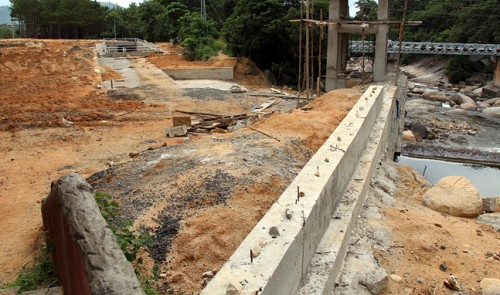Despite a call by the Steering Committee for the Central Highlands to stop all new hydropower projects in the region, a small hydropower project is going through the final procedures to build a plant in Chu Yang Sin National Park, in Dak Lak Province.
The project is moving ahead despite strong objections from park management, which says that the project will destroy six hectares of forest that belong to an area classified as “needing strict protection”. In 2005, the investor of the Ea K’tour Hydropower Project, in Cu Put commune, Krong Bong district, got approval from the provincial People’s Committee to develop the project on an area of 70 hectares in the park. Afterwards the authorities inspected the area and decided to suspend the project, but last year, the provincial People’s Committee allowed work on the project to move ahead on an area of just 6 hectares.
On August 1, 2013, the provincial Department of Industry and Trade proposed that the local government reduce the capacity of the future plant from the initial 7.5 MW to 5 MW.
The director of Chu Yang Sin National Park, Tong Ngoc Chung, warned that most of the forest area in question features biological diversity and is located in the basin of the EaK’tour stream. Therefore, if a hydro plant is built there, the park will not only lose about 6 hectares of forest, “which needs to be protected,” but will also see the loss of habitats for many rare and precious endemic species that are listed in both the domestic and global Red Book, Chung said. The plant would disrupt the stream’s flow, drying up a 3 km section and thereby causing the mass death of trees along its route. At the same time, many species of fish, reptiles, and amphibians will face extinction. In addition, the project will negatively impact the ecological environment, and cause noise that will scare away wildlife, Chung said. Project benefits park: investor Meanwhile, the project’s investor, Hoang Nguyen Co. Ltd, based in the province’s Ban Me Thuot City, maintained that the project will bring benefits to the park. Hoang Dinh Tuan, the company’s director, said the company has reduced the area of the project from 70 hectares to only 6 hectares, which is tiny compared to the overall area of the park. Among the small hydro projects in the province, this project will have the least impact on the environment, Tuan said. He affirmed that many provincial agencies have studied the issue, and they have decided to let the company carry out an environmental impact assessment report for the project. “The park covers hundreds of thousands of hectares, while the project occupies only 6 hectares of it. Construction of the plant will be completed in a year and will have no impact on the fauna and flora of the park. Moreover, if birds and other wild animals cannot continue to live in the park, then they will live in another place. It is nothing to worry about!” Tuan said. “The project help prevent deforestation in the park, and when the plant begins generating power, it will pay taxes to the authorities and forest fees to the park. Therefore, the park will suffer no losses, and will benefit from the project.” He also emphasized that his company has not asked for permission from the People’s Committee to build the plant, but “the authorities have invited the company to invest in the project.”Unadvisable Huynh Bai, chairman of Krong Bong District, said that the amount of taxes to be paid by the future plant are estimated at VND2-3 billion per year. This is a large sum compared to the budget of the mountainous district, but it is small compared to the damage it will bring to the environment and local life. “The loss in terms of the ecological environment is huge, and largely unforeseeable,” Bai said, adding that the District People’s Committee has repeatedly issued documents objecting to the project and demanding that it be suspended to protect the biological diversity of the park and the Dak Tour Cave. A small hydropower project like this, which is expected to make a small contribution to the national budget and national power grid while causing great loss and damage for the environment should not be built, Bai said. In commenting on the project, Dr Bao Huy, from the Tay Nguyen (Central Highlands) University said, “The construction of the plant will change the hydrological systems of both the stream and the Cu Yang Sin mountain, leading to adverse changes to the habitats of many species of plants and animals in the park and thereby damaging the biological diversity of the area.” Recently, the Steering Committee for the Central Highlands demanded that the Ministry of Industry and Trade halt the construction of hydropower plants in the Central Highlands until the end of next year pending review of their possible impact on the environment and local life.
The Committee suggested the suspension after it, the ministry, the Electricity Group of Vietnam (EVN) and the Party Central Committee’s Commission for Inspection inspected seven hydropower plants in the region. These projects have had a detrimental effect on the environment, undermined the ecological balance, flooded many areas, changed river currents, and harmed flora and fauna, the Committee said.






















































